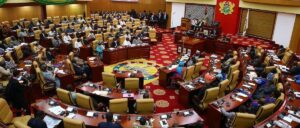The Ghanaian Parliament on Tuesday adopted a report recommending a review of the Petroleum Revenue Management Act, Act 815, to allow the government to invest petroleum revenues in ways that deliver maximum returns. The decision follows a report presented at the plenary by Mr. Eric Afful, Chairman of Parliament’s Economy and Development Committee, urging lawmakers to adopt the committee’s recommendations to enhance earnings and returns from petroleum resources.
The proposal for the review was initially made by Finance Minister Dr. Cassiel Ato Forson on November 13, immediately after presenting the 2026 Budget Statement to Parliament. According to Mr. Afful, the review is expected to improve investment returns on Ghana’s petroleum revenues, particularly the Petroleum Fund, by increasing interest yields from the current one per cent to about eight per cent.
“This review is critical for strengthening Ghana’s fiscal buffers and providing more resources for development projects,” Mr. Afful said. He added that higher returns from petroleum revenues would give the government additional funds to support infrastructure, social services, and other strategic national priorities.
Dr. Forson, during his budget presentation, noted that the Investment Advisory Committee had recommended revisiting the provisions of the Petroleum Revenue Management Act. The aim, he explained, is to ensure that petroleum revenues are prudently managed and invested in a manner that generates higher returns for the country.
“The proposed amendments are in line with Ghana’s petroleum revenue management framework and international best practices. They also safeguard transparency and accountability in the use of petroleum funds,” Dr. Forson said.
The review seeks to position Ghana to earn more from its petroleum resources, making the Petroleum Fund a more productive source of financing for development initiatives. By increasing interest yields and ensuring strategic investment of petroleum revenues, the government aims to strengthen fiscal stability and support long-term economic growth.
The parliamentary adoption of the committee report marks a significant step toward modernizing Ghana’s petroleum revenue management and ensuring that the nation benefits optimally from its natural resources.
